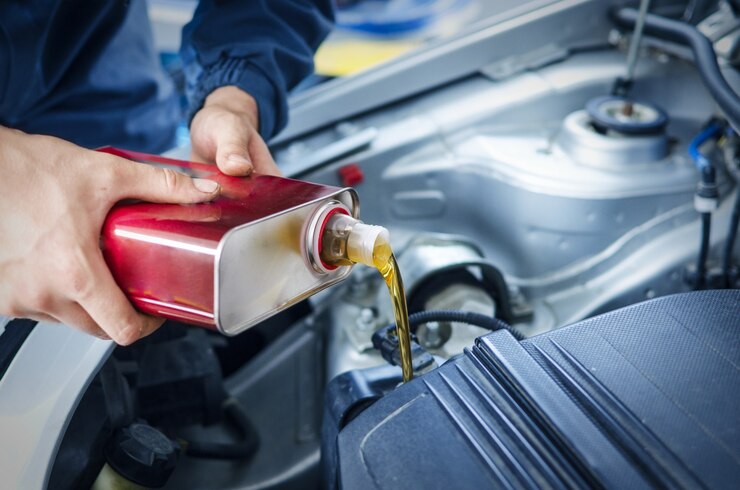
Getting regular oil changes is one of the simplest things you can do to keep your Hyundai running smoothly. Think of it like the food we eat: just as our bodies need proper nutrition, cars need clean oil to operate efficiently. It's easy to overlook this crucial service, but failing to change your oil can lead to bigger problems down the road. By sticking to a routine schedule, you ensure that your vehicle's engine stays in top condition, helping you avoid unexpected repair costs.
In West Islip, the importance of oil changes is especially pronounced due to varying seasonal conditions. Carrying out a Hyundai fluid replacement in West Islip ensures your car's performance is optimized, no matter the weather. With regular oil changes, you're not just maintaining your vehicle; you're guaranteeing peace of mind with every drive.
The Role of Oil in Your Hyundai
Oil is like the lifeblood of your Hyundai's engine, playing a key role in keeping everything running smoothly. Its primary function is to lubricate engine parts, reducing friction as they rub against each other. Without this lubrication, parts can wear out quickly and might even seize up, causing severe damage.
Here’s how oil keeps your Hyundai performing at its best:
- Lubrication: Oil coats the moving parts in your engine, ensuring they glide with minimal resistance. This reduces wear and tear and prolongs the life of your engine.
- Heat Regulation: As your engine runs, it generates a lot of heat. Oil helps carry away some of this heat, preventing your engine from overheating.
- Cleaning: Over time, dust, dirt, and other contaminants can build up inside your engine. Oil captures these particles, keeping them away from your engine's vital components.
- Corrosion Protection: The oil also forms a seal between pistons and cylinders, helping to keep corrosive materials from attacking the metal surfaces.
If you start to notice darker smoke from your exhaust or hear knocking sounds, it might be a sign that your oil needs changing. Regular maintenance is the best way to ensure these issues don't escalate, and your Hyundai keeps performing the way you expect.
Benefits of Routine Oil Changes
Making sure you get routine oil changes comes with a host of benefits for your Hyundai. When you change your oil regularly, you help keep your engine clean and running smoothly. This simple maintenance step is key to maintaining engine health over time. Dirty oil can lead to thicker sludge forming in your engine, which makes it work harder than necessary. Fresh oil ensures your engine's parts stay lubricated and helps prevent overheating.
Here's how sticking to an oil change schedule benefits your Hyundai:
- Engine Longevity: Consistent oil changes reduce friction and prevent wear. This keeps your engine in good shape for a longer time.
- Fuel Efficiency: Clean oil improves your vehicle's fuel efficiency. It allows the engine to run more smoothly, using less gas and saving you money at the pump.
- Corrosion Prevention: New oil wards off engine corrosion, protecting key components from rust and decay.
- Reduced Emissions: By maintaining clean oil, you help decrease the harmful emissions coming from your car, contributing to a cleaner environment.
Regularly getting your oil changed is a small investment that pays off by keeping your Hyundai at its best.
What Happens During an Oil Change
Wondering what goes on during an oil change? It's more than just swapping out old oil for new. Here's a rundown of what typically happens during a professional oil change service:
1. Old Oil Draining: The technician first drains the old oil from your engine, making sure it's completely empty.
2. Oil Filter Replacement: A fresh oil filter is installed. This component is essential as it catches contaminants and debris, preventing them from cycling back through the engine.
3. New Oil Addition: The next step is to add fresh oil, using the right type and grade specified for your Hyundai. The right oil type is crucial for ensuring your engine operates efficiently.
4. Component Check: While your vehicle is in the shop, other essential fluids like brake and transmission fluids are inspected. They may top them off if needed.
5. Quality Control: Finally, they start the engine to let the new oil circulate. Technicians check for leaks and ensure everything is operating as it should.
Understanding these steps helps you appreciate the full scope of service given during a typical oil change. It’s a comprehensive process that does more than just fill your engine with fresh fluid.
Finding Reliable Oil Change Services in West Islip
Getting your oil changed by a certified provider ensures the job is done correctly, safeguarding your Hyundai's engine and overall performance. In West Islip, there are several options available, but selecting a reputable service provider makes a difference. Certified technicians understand the specific needs of Hyundai vehicles and use quality parts and oils tailored for them.
Maintaining consistent service records is more than just paperwork; it’s an investment in your car’s future value. When it comes time to sell or trade in your vehicle, a well-documented service history can enhance its value, demonstrating it has been well cared for.
To make scheduling easy, set reminders for when your next oil change is due and consider linking it with another regular event, like a holiday or back-to-school season. Many service centers also offer online scheduling to help you plan without the hassle. Keeping your Hyundai running smoothly boils down to making these small yet impactful decisions. By staying proactive about oil changes, you ensure your car is always ready for the road.
Maintain your vehicle’s peak performance by considering a Hyundai fluid replacement in West Islip. At Atlantic Hyundai, we're committed to keeping your car running smoothly and efficiently. Trust our certified team to provide the quality service your engine deserves, ensuring it’s always ready for your next adventure. Visit our service center to schedule your next appointment.

